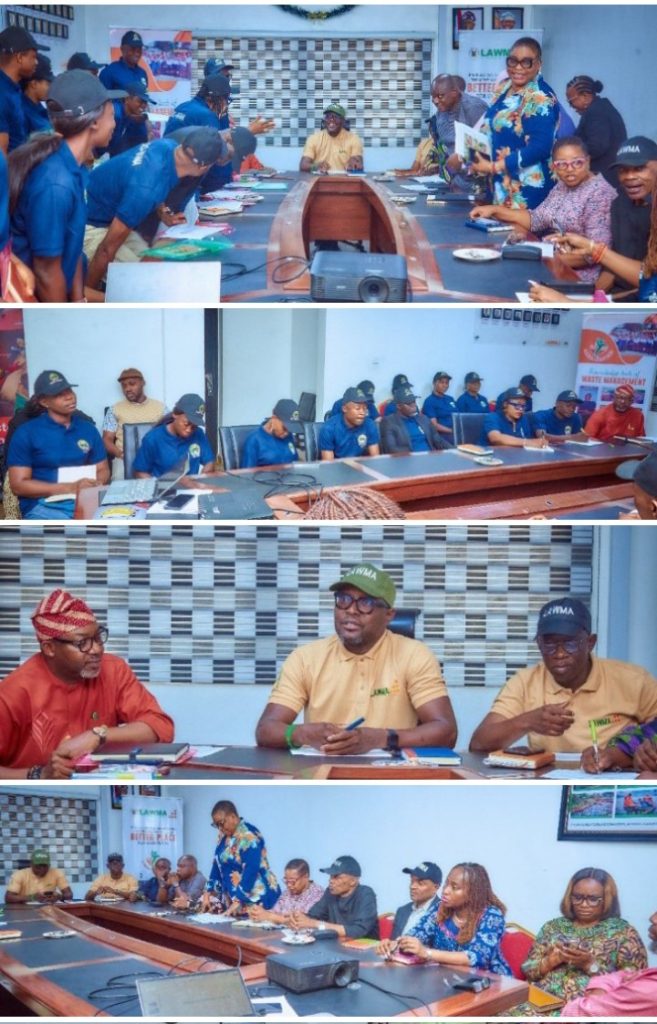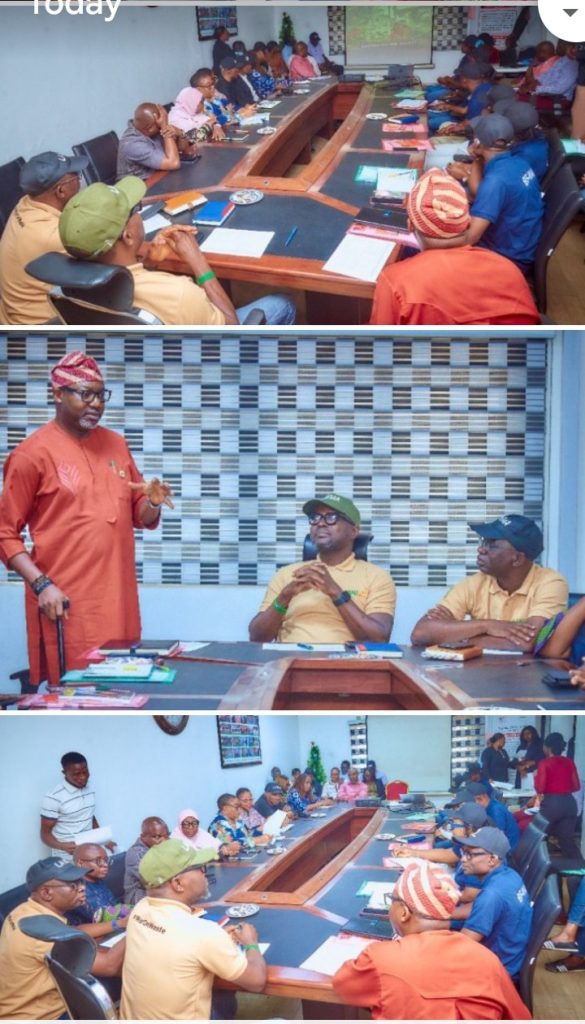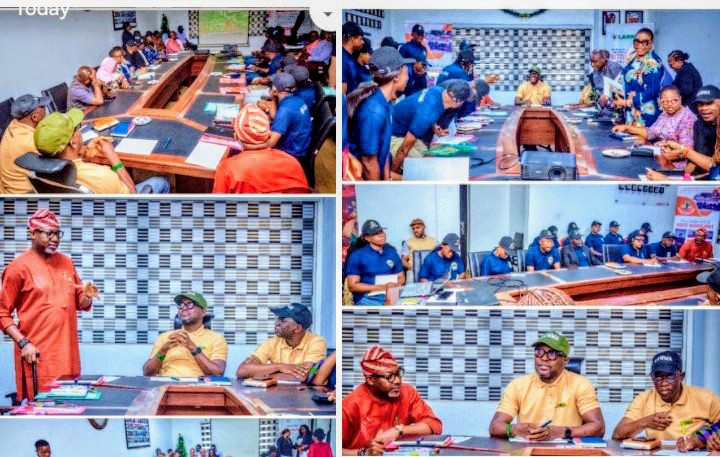By Kehinde KOLAWOLE

The Lagos Waste Management Authority (LAWMA) has kicked off a three-day intensive training program for select staff members of the Ekiti State Waste Management Authority (EKSWAMA), aimed at enhancing their professional approach to waste management.
According to a press statement signed by the Director Public Affairs, Folashade Kadiri (Mrs), it states categorically that the EKSWAMA delegation, led by its Director-General, Mr. Olasunkanmi Onipede, was warmly received by the Managing Director/CEO of LAWMA, Dr. Muyiwa Gbadegesin, alongside his management team at LAWMA’s headquarters in Ijora Olopa, Lagos.
In his welcome address, Dr. Gbadegesin expressed LAWMA’s commitment to sharing expertise and fostering collaboration with other states and even neighboring West African countries. He emphasized the importance of adopting modern, scientific waste management techniques to address environmental challenges effectively.
Reflecting on LAWMA’s evolution, Gbadegesin noted that the Authority began as a Refuse Collection Board in 1977 but was transformed into a professional and scientific waste management agency in 1999 under the leadership of then-Governor of Lagos State, Asiwaju Bola Tinubu, now President of Nigeria.
The training underscores LAWMA’s pivotal role in advancing sustainable waste management practices across the country, positioning Lagos as a model for effective environmental solutions.
The Lagos Waste Management Authority (LAWMA) has reaffirmed its leadership in waste management as it commenced a three-day training for staff of the Ekiti State Waste Management Authority (EKSWAMA). The initiative aims to equip the EKSWAMA team with practical and innovative strategies to improve waste management systems in Ekiti State.

Welcoming the delegation at LAWMA’s headquarters in Ijora Olopa, the Managing Director/CEO of LAWMA, Dr. Muyiwa Gbadegesin, emphasized the scale of Lagos’ waste management operations, handling waste from over 23 million residents who generate approximately 13,000 tonnes daily. He described the process as a continuous cycle of learning, unlearning, and relearning to meet growing environmental challenges.
“Managing waste at this scale is no small feat. LAWMA has continuously introduced innovations to improve efficiency. Today, we work with over 400 Private Sector Participants (PSPs), each operating at least two compactors, to evacuate household waste across Lagos. Our transition from a linear to a circular economy, adopting the reduce, reuse, and recycle model, positions us as a hub for learning. With our experienced professionals, this training will provide both theoretical and practical insights. I assure you that this is just the beginning—you will find yourselves returning for more,” Gbadegesin stated.
In response, EKSWAMA Director-General, Mr. Olasunkanmi Onipede, expressed his team’s eagerness to learn from LAWMA’s expertise. He underscored the importance of replicating Lagos’ successful waste management strategies in Ekiti State, which serves a population of nearly 3.5 million.
“Lagos is the ideal place to learn. Managing waste for over 23 million residents is no small task, and we are here to study LAWMA’s system, which is undoubtedly worth emulating. This training marks the beginning of a stronger partnership. We are ready to learn, adopt best practices, and improve EKSWAMA’s operations. Thank you for sharing your wealth of knowledge with us,” Onipede remarked.
The training signifies LAWMA’s commitment to sharing its expertise and fostering partnerships to advance sustainable waste management practices across Nigeria.
A network error occurred. Please check your connection and try again. If this issue persists please contact us through our help center at help.openai.com.
The Head of PSP Domestic Services at the Lagos Waste Management Authority (LAWMA), Dr. Tunde Suleiman, has highlighted the evolving nature of the waste management sector and the critical processes involved in handling solid waste in a megacity like Lagos.
Speaking during a lecture on waste management principles and practices, Dr. Suleiman explained that effective waste management goes beyond simple collection. “It involves a chain of processes, including treatment, transportation, and disposal, covering various types of waste such as hazardous, commercial, recyclable, organic, healthcare, and domestic waste,” he stated.
He underscored LAWMA’s commitment to environmental best practices, noting that managing waste in a city as vast and populous as Lagos requires more than just operational efficiency. According to him, advocacy and public sensitisation are essential tools for sustainable waste management.
“Rolling out all the compactors in our fleet to clear public spaces would still not be enough, and the cost would be prohibitive. This is why we focus on changing the mindset of residents. Advocacy helps us address the root cause—people’s poor attitude towards waste disposal,” Dr. Suleiman explained.
He emphasized that achieving attitudinal change among residents would significantly reduce the burden on LAWMA’s operations. “If people embrace positive habits towards their environment, there would be less need for daily road cleanups. Enforcement remains a last resort, but our priority is to build a culture of environmental responsibility,” he concluded.
Dr. Suleiman’s remarks reflect LAWMA’s broader strategy to balance operational efforts with community engagement, ensuring a cleaner and healthier Lagos through collaboration and awareness.
The Lagos Waste Management Authority (LAWMA) has commenced a three-day intensive training program designed to equip participants with in-depth knowledge of the Authority’s waste management systems and operations.
The Director of Medical Health and Safety Services, Dr. Modupe Okoh, set the tone with a general safety talk, emphasizing the importance of safety in waste management practices. This was followed by an overview of the training schedule delivered by the Director of Public Affairs, Mrs. Folashade Kadiri. Participants were also treated to short documentaries showcasing LAWMA’s activities and achievements across the city.
The training program will comprehensively cover core aspects of LAWMA’s operations, including landfill management, advocacy strategies, human resource administration, circular economy principles, waste management finance, environmental health, legal services, and compliance monitoring.
To provide practical exposure, participants will embark on field trips to key LAWMA facilities. These include the Olusosun landfill—one of the largest in Africa, the waste-to-energy plant at Ikosi-Ketu, and the operational district in Mushin, where LAWMA’s daily activities are coordinated.
The initiative reflects LAWMA’s commitment to building capacity and fostering innovation in waste management, ensuring that Lagos remains a cleaner, healthier, and more sustainable megacity.









